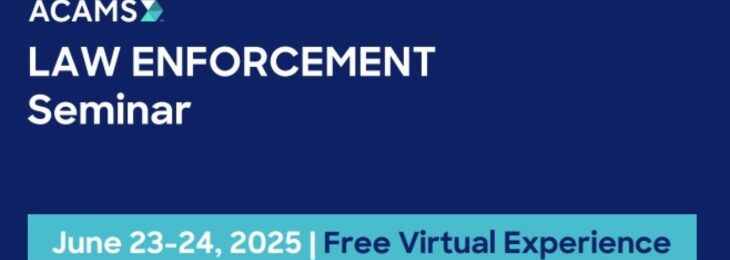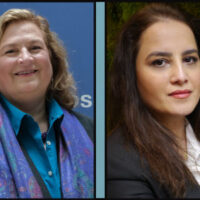
ACAMS Today had the opportunity to speak with Angela Guanzon—human trafficking survivor and anti-human trafficking advocate—about her experiences with the Coalition to Abolish Slavery and Trafficking (CAST) organization and how collaboration is key in combating human trafficking. Guanzon was born and raised in the Philippines where, as a young adult, she was recruited by a foreign labor broker with promises of a good job in America. At the time, her father had fallen ill and she wanted to support her family by quitting school and getting a job, so she pursued the opportunity presented to her by the labor broker. She was then forced to pay her life-savings for the labor broker fees and when she arrived in the U.S., Guanzon met her trafficker for the first time. The trafficker proceeded to take her passport and other documents and threatened her with violence and verbal abuse, saying that she owned her. Guanzon was forced to work without pay and sleep on the hallway floor at an assisted living center in Long Beach, California. Every move she made was monitored closely. Guanzon was trapped and her hope for a better life diminished.
When a neighbor tipped off the authorities, the FBI discreetly got a message to Guanzon with an action plan for her escape. The FBI infiltrated the assisted living facility with the help of Guanzon, who bravely strapped herself with a surveillance device to uncover the human trafficking operation. The authorities worked closely with CAST, a nonprofit organization dedicated to providing comprehensive care for human trafficking survivors, to identify the human trafficking case. Thanks to CAST’s partnership with law enforcement, CAST was able to be there for Guanzon and her coworkers who successfully escaped the assisted living center. Guanzon was immediately welcomed to CAST’s shelter, where she received comprehensive social and legal services to get her back on her feet.
Guanzon currently works full time as a medical biller and coder. She is also a member of CAST’s survivor leadership program where she serves in a leadership role to change systems and pass laws to protect victims.
In 2012, Guanzon was awarded the CAST Seeds of Renewal Award and was recognized by Congressman Ed Royce for her courage and leadership for advocating to pass California Law SB 477, which was signed by Governor Jerry Brown in September 2014.
Guanzon remains an active advocate for victims of human trafficking. She provides training to healthcare providers, victim advocates and law enforcement. Guanzon participated in the development of the 40-hour Human Trafficking Investigation course with the California Commission on Peace Officer Standards and Training, and the Department of Justice Office for Victims of Crime Professional Development for Human Trafficking Survivors pilot training.
In 2016, Guanzon was a fellow for the Human Trafficking Leadership Academy supported by the federal Office on Trafficking in Persons.
ACAMS Today: First, we would like to thank you for your bravery and your continued efforts in the fight against human trafficking. Tell us about your experience with the CAST survivor leadership program. What is the most important lesson this program teaches? Do you have any specific success stories you would like to share from the program?
Angela Guanzon: I want also to take this opportunity to thank you for fighting together with us with this issue. Being a leader does not mean you will always be in the forefront. You can also be the person that motivates, mentors and supports someone to be successful. I truly learned to listen and understand others, so when I talk I know what to say.
The best success story that I can share is my own story. Since I joining the leadership program, I have gained more self-confidence. I am so proud of becoming a member of the survivor group. We have done so much in the field, but I know that we have more work to do and we will not stop. When the California Foreign Labor Recruitment Law (SB 477) passed and was signed by Governor Brown in 2014, I was so happy and proud of myself. I couldn’t believe that this bill came from our idea and it became law. That gave us more energy, momentum and left us craving more success.
AT: What was it like collaborating to develop the 40-hour Human Trafficking Investigation course with the California Commission on Peace Officer Standards and Training?
AG: Working with law enforcement is very challenging at times, even though my experience with the law enforcement involved in my case was a very positive one. Most of the members in the group had a bad experience when they were being trafficked and even after they escaped their situation and received help. I think my involvement in the video for the course was a good choice, as the audience can now hear information coming directly from a human trafficking survivor. Most of law enforcement thinks that labor trafficking is not as bad as sex trafficking and that it is less prevalent. As an advocate and survivor of labor trafficking, we always have to fight to be heard as labor trafficking does not receive the same attention as sex trafficking.
AT: What tips can you share from your anti-human trafficking training? Do the tips differ depending on the group you are training?
AG: When we train, we always ask who our audience is and what part of our story would be beneficial for learning more. Most of the time, people love to hear the tragedy of our human trafficking stories, but we have learned that we can share our story in an educational way. It has always depended on the audience—a group that truly wants to know how to get involved and how to prevent trafficking and a group that has never heard about human trafficking and does not know what it is cannot be told the same story the same way. So, we tailor our training material and make sure we are ready before the training day.
AT: What more can the anti-financial crime community do to combat human trafficking?
AG: Look for partnership and collaboration opportunities that allow for training, so people can know what to do, what to look for and for other resources on possible red flags in their customers. As a survivor, I cannot work by myself to fight this. Each one of us in the community plays a significant role in fighting this issue.
When I was in my trafficking situation I did not have my identity, which meant I had no ID and no credit card to establish credit. So, when I started to build my life, I had no idea that you need to have a good credit history just for a cell phone; even to open a bank account you need two forms of ID. I remember when I went to a bank to inquire how to open an account, all I had was a piece of paper from CAST proving that they knew me and vouched for my identity. However, the teller did not recognize the document and I was not sure if I should tell her my story. This is the dilemma survivors like me face when getting back on our feet. Some survivors have difficulty in regaining credit and access to financial resources like bank accounts because their trafficker uses their name when they are in their situation.
Safe housing, jobs and good credit are the most important factors for survivors to start our journey and to become a functioning member of society. It is crucial to establish a partnership with local anti-trafficking service providers and assist with survivors’ needs to help them get back on their feet.
AT: How will you observe National Human Trafficking Awareness Day?
AG: I always attend the Freedom Walk. We walk with signs about human trafficking and chant and I commit to speak at those events as much as I can. People are more active and interested there, so we take advantage of this.
AT: When you are not advocating for human trafficking awareness, what do you like to do in your spare time?
AG: I like to hang out with whomever is available from the group, rest at home while watching TV or knit. At night, I video call with my family from the Philippines. It took me a long time to find spare time, as I used to work extra when I would get home, so it is hard for me just to sit and do nothing. However, I learned how to take care of myself and now I love it. Everything I have right now I have because I am free and it was all because of the people who actively care for humanity. What happened to me is my past and that helps me stay grounded. I will be forever grateful for my second chance.










